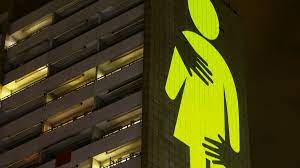A trauma shielded too long by shame and silence, more and more people are raising their voices to combat violence against women from Washington to South Asia and Europe.As once respected figures and entertainment and other professions, including former USA Olympics team doctor Larry Nassar, face consequences for sexual assaults, traumatized survivors struggle.I'm angry with myself for not recognizing the abuse and that's something I'm struggling with today.That's a common response, says a women's rights activist who was sexually assaulted as a college student.I remember at the time feeling like, oh, is what happened to me a crime or not.And I think that's a very common reaction for a lot of survivors, you know, because violence against women is so normalized.Other young victims are trafficked for prostitution or pornography, sometimes by acquaintances, increasingly by street gangs.They're gang-raped, they're beaten beyond, you know, belief, they're addicted to drugs, they're chained to furniture, they're put in cages.And sometimes coerced into involvement in major crimes including shootings and robberies.

Abusers can have a psychological hold over their victims which workers in the field call a trauma bond, says a survivor of domestic sex trafficking who helps other survivors.Now imagine that bond starting in a 12-year-old girl, 13-year-old girl, and going, you know, for most of their life just with a continuum of different faces attached to it.An international study says nearly half of young victims of human trafficking are trafficked by family members.You're just seeing the system break down in so many ways that these kids are either ending back with their family member who is trafficking them.They might end up in foster care and then run away and end up on the streets.Whether victims of trafficking or domestic violence, survivors need comprehensive help, says a charity worker who oversees transitional housing for Muslim women and others.Oftentimes these women have been held captive almost have no savings, have no really employable job skills.Some women and trafficked teenagers are drawn into prostitution or pornography or they struggle in one homeless shelter after another.It's really difficult when you have a woman who, you know, maybe has left an abusive marriage is trying to make a better life for herself or for her children.But every day she's exposed to someone in the shelter who's, you know, actively abusing drugs or alcohol, or people who have severe mental health issues.What is needed they say long-term housing, education and emotional support.To that end they say more government funding will not solve the problem but will help.Mike Osullivan voa news













